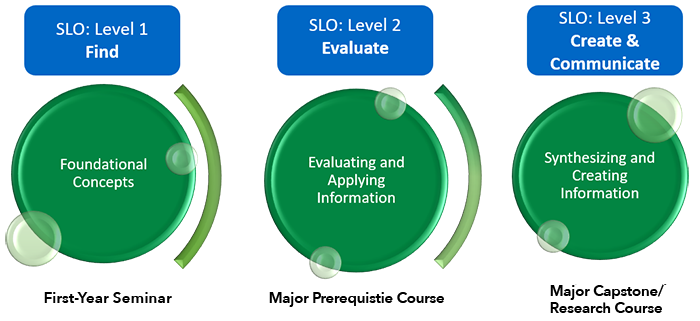Student Learning Objectives Student learning objectives (SLOs) based on the TAMU-CC definition of digital information literacy outlined above were developed for each level of learning to be scaffolded into the curriculum. A subcommittee made up of faculty and staff from the QEP Development Committee reviewed the ACRL Framework, the Library’s existing information literacy SLOs, and the UT Martin MILE’s SLOs before breaking into smaller teams to draft SLOs for each of the three identified levels: Find, Evaluate, and Create/Communicate. The subcommittee discussed the wording of each SLO at length to ensure that it captured specific outcomes that students should be able to demonstrate as a result of the interventions provided in the designated IKnow courses. The work of the SLO subcommittee was shared with the QEP Development Committee for review and feedback, which was then incorporated into a final draft of the SLOs.
The first topic, Find, is considered the first SLO level to be introduced in First-Year Seminar sections. Students should be able to identify and pursue effective digital approaches for accessing information, as well as assess the quantity, quality, and relevance of their search results. Students are expected to be able to perform actions such as keyword searching and citation following.
The second topic, Evaluate, is the second SLO level which should be incorporated into major prerequisite courses identified by the academic program. Upon completion of these courses students should be able to evaluate a source’s credibility and suitability in the context of their information needs. Students should be able to properly identify credible and appropriate sources for their assigned work.
The topics of Create and Communicate make up the third level of SLOs and should be integrated into major capstone or research courses. Once the courses have been completed a student should be able to create effective research questions based on curiosity and gaps in the information or data available, and use appropriate technology to create knowledge, collaborate with others, or contribute to scholarly conversations. Students should be able to reach a level of understanding that allows for creative development of content that can be shared with the digital community.
| SLO Level |
Course |
Topic |
Student Learning Objective |
| Level 1 |
First Year Seminar 1101 and 1102 |
Find |
Identify and pursue effective digital approaches for accessing information (such as keyword searching and citation following) as well as assess the quantity, quality, and relevance of their search results. |
| Level 2 |
Major Pre-requisite Courses |
Evaluate |
Evaluate a source’s credibility and suitability in the context of their information needs. |
| Level 3 |
Major Capstone/Research Courses |
Create |
Create effective research questions based on curiosity and gaps in the information or data available. |
| Level 3 |
Major Capstone/Research Course |
Communicate |
Use appropriate technology (such as shared documents and digital presentation software) for creating knowledge, collaborating with peers, and contributing to scholarly conversations. |
